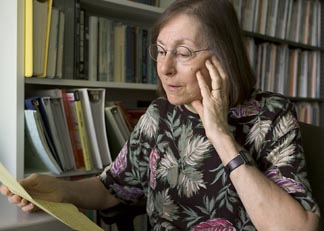Search committee members get first look at growing list of candidates

Last week, members of the Cornell University Presidential Search Committee (PSC) began the painstaking process of winnowing down a large, growing list of potential candidates. During a meeting of the full committee in the Cornell Club in Manhattan Sept. 21, PSC members started to review a database of more than 150 presidential nominees whose names were submitted through both formal and informal channels. They were joined by a representative from the search firm of Korn/Ferry International.
"It was the first chance we've had to get a sense of what the field will be like," said Susan Murphy, vice president of student and academic services and PSC member. "We have a lot of hard work ahead of us."
In addition, a PSC subcommittee held a video-conference with a small group of faculty at Weill Cornell Medical College in Qatar. During the week, the PSC, through Ezra Cornell, continued to solicit input from administrators and deans on the Cornell campus.
"Things are moving along," said Cornell.
While still in its early stages, Elizabeth (Lisa) D. Earle, one of five faculty members on the PSC, said the search so far "has been well-organized and thoughtful. But … the important work of identifying and interviewing the most promising candidates has just gotten under way."
Earle is a professor in the Department of Plant Breeding and Genetics, College of Agriculture and Life Sciences (CALS), and a faculty-elected member of the Cornell board of trustees since 2002. She joined the Cornell faculty in 1979 and has been active in campus governance, including current membership on the University Faculty Committee (the executive committee of Cornell's Faculty Senate). Her research focuses on genetic improvement of crop plants via cell culture and gene transfer, with emphasis on vegetable crops such as broccoli and onions. A particular interest is appropriate deployment of genetically modified insect-resistant crops.
"As a member of the search committee, my role is to represent the entire Cornell community, not just the faculty," she said. "I plan to work hard to identify and recruit the best possible person as our next president. That being said, I will use my experience to ensure that faculty perspectives, among others, on choice of a new president are clearly heard and to raise appropriate questions at each step of the process."
Earle was in the news last June when she read an essay on National Public Radio's "This I Believe," a revival of Edward R. Murrow's original show that now airs on Morning Edition and All Things Considered. In 1954, Earle had won Murrow's daily essay and recorded it for broadcast around the country on the CBS radio network. She was invited by an NPR producer to write a new essay -- a sort of then and now exercise -- for the show that aired in June. http://www.news.cornell.edu/stories/June05/EarleProfile.kr.html.
As a trustee she is a member of the Finance, Academic Affairs, Alumni Affairs and Development, and Trustee-Community Communications committees. She also is a member of the subcommittee on Faculty Development and the Ad Hoc Committee on Tech Transfer, Economic Development and Corporate Alliances. In addition, Earle led the Trustee Nominating Committee, which oversees election of student and employee trustees, from 2003 to 2005.
In addition to her work with the University Faculty Committee, Earle is a member of the General Committee of the Graduate School, the Plant Cell and Molecular Biology Program, and the steering committee of the BK21 program linking CALS and Seoul National University. She also serves as director of graduate studies for the graduate field of plant breeding. She has been an at-large member of the University Faculty Senate, SUNY faculty senator for CALS and a member of the CALS Advisory Group on Agricultural Biotechnology. She received a B.A. from Swarthmore College in 1959 and a Ph.D. degree in biology from Harvard University in 1964.
"I know -- and am known to -- many people in all parts of the university, who are offering suggestions and advice about the search," she said. "I think almost everyone hopes that the next president of Cornell will be a thoughtful and articulate academic with a broad vision of the university, a strong public persona, a commitment to Cornell, and a willingness to embrace its mission and understand its culture."
For a complete description of all PSC members, visit the search committee Web site at http://www.cornell.edu/presidentsearch/.
Media Contact
Get Cornell news delivered right to your inbox.
Subscribe